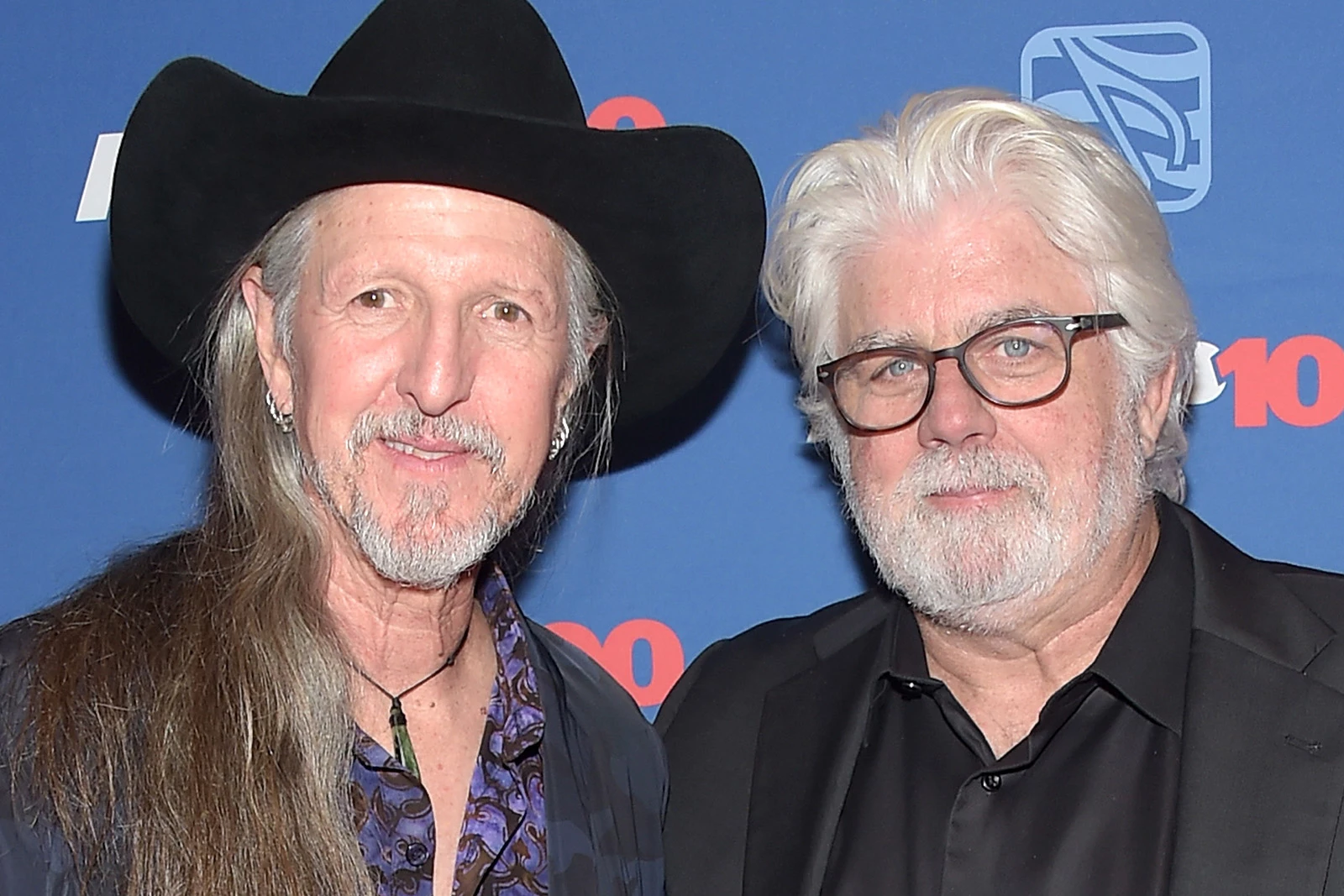
The Struggle to Bring Michael McDonald Into the Doobie Brothers
by Martin KieltyDoobie Brothers guitarist Patrick Simmons had to play the persuasion game when the band faced a frontman crisis in the mid ’70s.
Original singer Tom Johnston had suffered health issues for several years, and by 1975 he was unable to perform, leaving his bandmates with the challenge of touring without him and taking turns on lead vocals.
The following year, they had to turn their thoughts to a new album, and while Simmons thought he had found a solution in Steely Dan’s Michael McDonald, no one else seemed to share his enthusiasm, as he told Uncle Joe Benson on the Ultimate Classic Rock Nights radio show.
“We got this guy that’s a sideman right now, but I think he’s dynamite,” Simmons recalled telling his bandmates. “Would you be into, like, hearing him on some of the songs? ... They go, ‘Well, okay ... .’ So I call, I say, ‘Mike, feel like coming over here?’ Mike’s, like, ‘Oh, I dunno, I got a couple songs – maybe … .’"
Simmons said McDonald finally "came over. He just sat right down at the piano and started playing some of these songs. He didn’t even have the songs completely written. He just had ideas, and one of those was ‘Takin’ It to the Streets.’ And we heard that, and we all went, ‘That’s a song.’”
The track eventually gave the Doobies’ 1976 album its title and launched a new era for the band.
Be sure to listen to Ultimate Classic Rock Nights on more than 50 stations across the U.S. from 7PM until midnight, Monday through Friday. You can see the list of radio stations where it airs here.
Doobie Brothers Lineup Changes: A Complete Guide
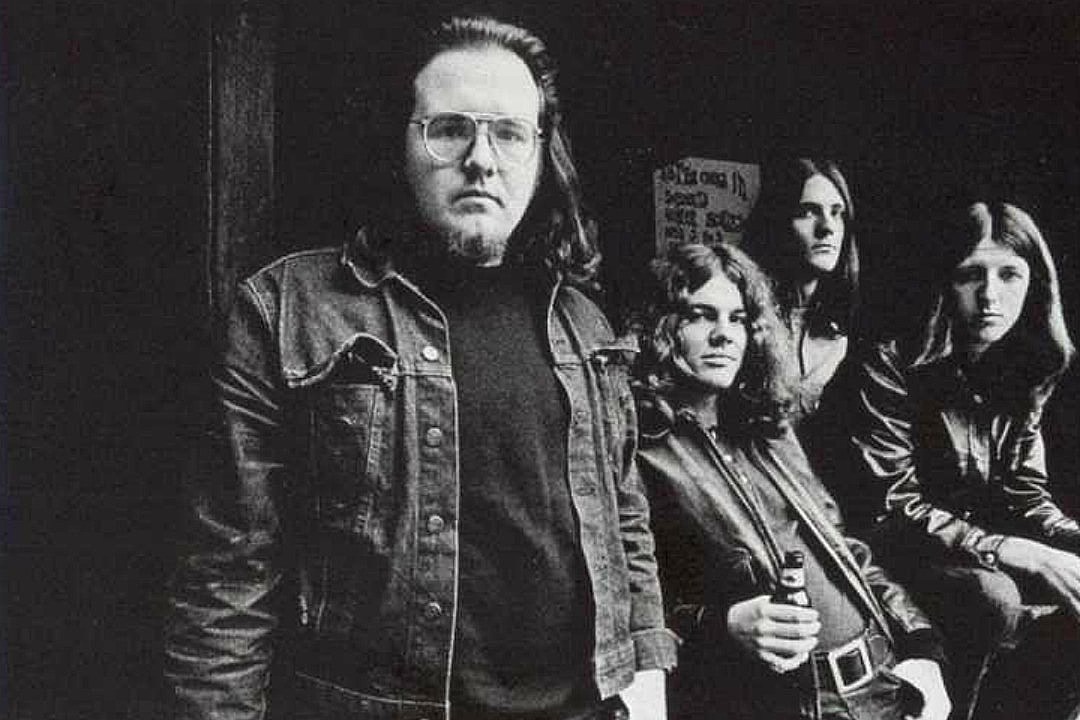
1970-71: Tom Johnston / Patrick Simmons / Dave Shogren / John Hartman
Formed by guitarist Tom Johnston and drummer John Hartman as Pud, the band picked up another singer and guitarist, Patrick Simmons, and bassist Dave Shogren and changed its name to the Doobie Brothers. A year later, they recorded their self-titled debut, but during sessions for the follow-up, 'Toulouse Street,' Shogren left.

1971-73: Tom Johnston / Patrick Simmons / John Hartman / Tiran Porter / Michael Hossack
The departure of Shogren made way for Tiran Porter, who had previously played with Simmons in an acoustic group called Scratch. Around this time, the Doobies also added a second drummer, Michael "Big Mike" Hossack, whom they knew from another Bay Area group called Mourning Reign that had broken up.

1973-74: Tom Johnston / Patrick Simmons / John Hartman / Tiran Porter / Keith Knudsen
Citing burnout from the band's hectic pace, Hossack left the band during the sessions for 'What Were Once Vices Are Now Habits.' He was replaced by Keith Knudsen, who had worked with Lee Michaels, but Knudsen's contributions to that record were limited to backing vocals.

1974-75: Tom Johnston / Patrick Simmons / John Hartman / Tiran Porter / Keith Knudsen / Jeff "Skunk" Baxter
When Donald Fagen and Walter Becker of Steely Dan, with whom the Doobies toured, decided to stop playing live, Jeff "Skunk" Baxter, who'd contributed guitar and pedal steel to a pair of earlier Doobie Brothers albums -- 'The Captain and Me' and 'What Were Once Vices Are Now Habits' -- became a full-time member. The move wound up giving the band a distinctive three-guitar, two-drum attack.
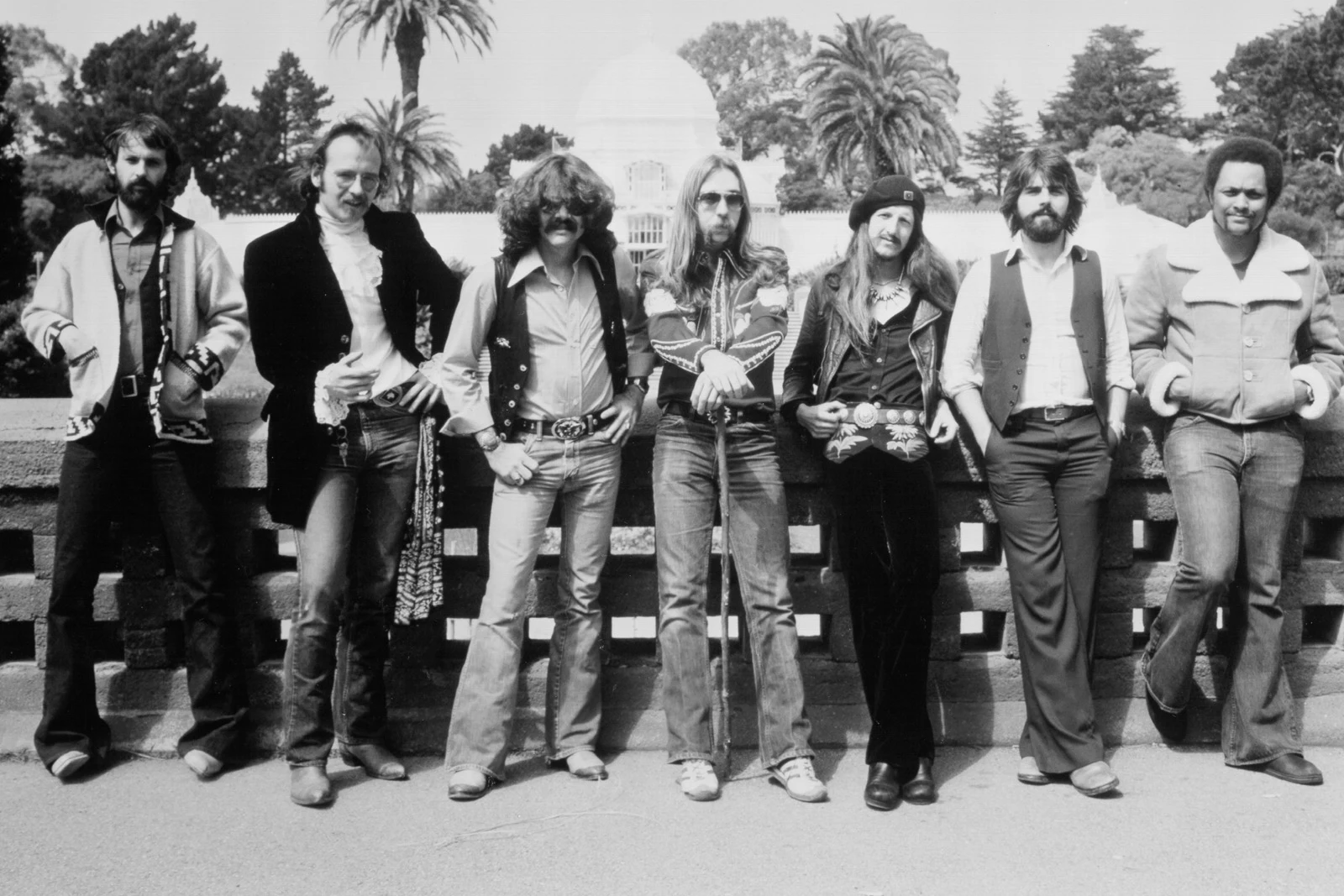
1975-77: Patrick Simmons / Tom Johnston / Michael McDonald / Jeff "Skunk" Baxter / Tiran Porter / Keith Knudsen / John Hartman
During the tour for 1975's 'Stampede,' Johnston was hospitalized with a bleeding ulcer and was told to give up touring for at least a year. To fill in, Baxter suggested former Steely Dan backup singer and keyboardist Michael McDonald. But contrary to public perception, Johnston remained in the band for a few more years. He contributed vocals and guitar to the band's first album with McDonald, 1976's 'Takin' It to the Streets,' before eventually leaving during the sessions for 1977's 'Livin' on the Fault Line.'

1977-79: Patrick Simmons / Michael McDonald / Jeff "Skunk" Baxter / Tiran Porter / Keith Knudsen / John Hartman / Bobby LaKind
Bobby LaKind had been a lighting roadie for the Doobie Brothers, but his talents as a percussionist and background singer were discovered and eventually earned him a spot in the band. This was the period where McDonald solidified his role as the focal point in the band. He wrote six songs for 1978's 'Minute by Minute,' including "What a Fool Believes," which earned the singer the first three of his five Grammys.

1979-80: Patrick Simmons / Michael McDonald / John McFee / Tiran Porter / Keith Knudsen / Chet McCracken / Bobby LaKind / Cornelius Bumpus
The man who brought McDonald into the band soon took exception to the new music the Doobies were making. Jeff "Skunk" Baxter wanted to move in a more experimental direction, keeping the spotlight on guitars over the keyboard-heavy studio polish McDonald brought. At the same time, founding drummer John Hartman was dissatisfied with the music industry and left to raise horses on his ranch. Baxter was replaced by multi-instrumentalist John McFee from the band Clover, who had backed Elvis Costello on his 1977 debut LP, 'My Aim Is True.' Chet McCracken, a session drummer whom McDonald knew, took over for Hartman. They also added Cornelius Bumpus on saxophone, keyboards and vocals.

1980-82: Patrick Simmons / Michael McDonald / John McFee / Willie Weeks / Keith Knudsen / Chet McCracken / Bobby LaKind / Cornelius Bumpus
Another Doobies founder, bassist Tiran Porter, left after the completion of 'One Step Closer' and was replaced by session pro Willie Weeks. After this, the only other original member, Patrick Simmons, also left, but he was coaxed back for one final tour. The last show, which took place on Sept. 11, 1982, at the Greek Theatre in Berkeley, Calif., saw Johnston and Hartman return to the stage with their old bandmates for a few songs.
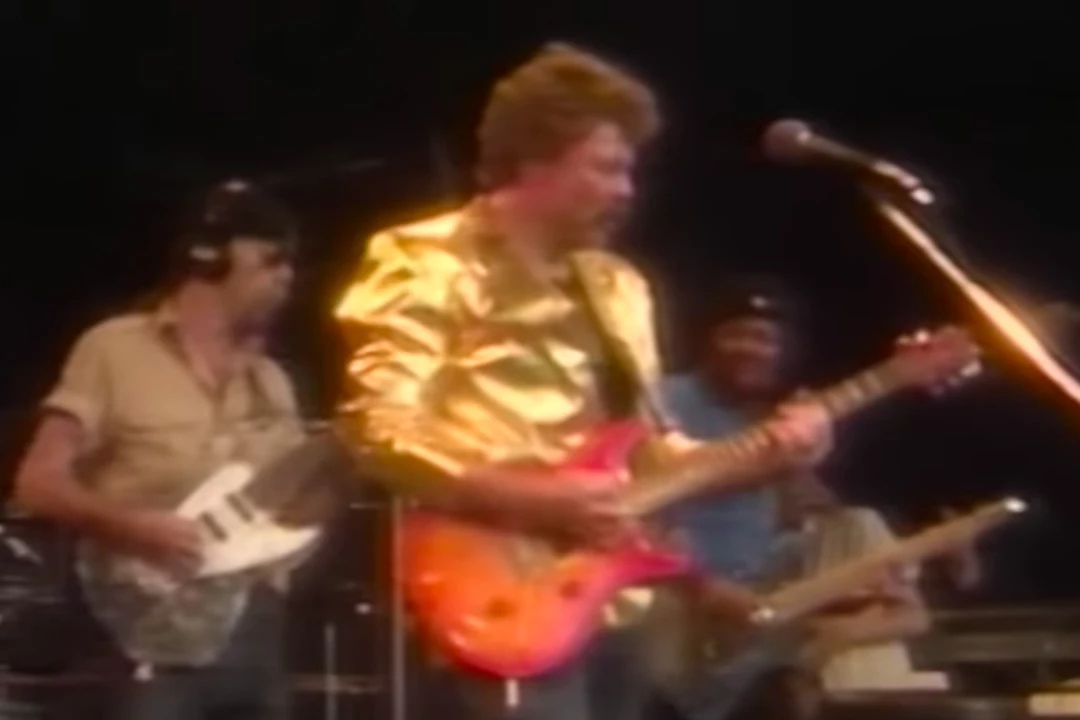
1987: Tom Johnston / Patrick Simmons / Michael McDonald / John McFee / Jeff "Skunk" Baxter / Tiran Porter / Michael Hossack / John Hartman / Keith Knudsen / Chet McCracken / Bobby LaKind / Cornelius Bumpus
Five years after that "final" concert, Knudsen recruited 11 of his former bandmates to help raise money for veterans, with only two ex-Doobies, bassists Dave Shogren and Willie Weeks, not participating. It turned into a small tour, with 10 shows mostly on the West Coast -- all for either veterans' or children's charities -- and a July 4 date (without McDonald, McFee and Knudsen) in Russia, as part of a festival to promote peace between the U.S. and the Soviet Union at Moscow's Izmajlovo Stadium.

1988-90: Tom Johnston / Patrick Simmons / Tiran Porter / John Hartman / Michael Hossack / Bobby LaKind / Cornelius Bumpus
The success of the reunion tour led to a full-blown reboot of the lineup that recorded 'Toulouse Street' and 'The Captain and Me,' with LaKind added to the mix. It resulted in the 1989 'Cycles' LP, which featured the hit single "The Doctor" and songwriting contributions from McDonald, McFee and Knudsen. Even though he didn't play on the record, Bumpus returned for the subsequent tour, but LaKind left before it started due to health issues. The band hired Jimi Fox and Richard Bryant to handle LaKind's percussion; Dale Ockerman, who played on 'Cycles,' began a lengthy stint as the band's touring keyboardist.

1991: Tom Johnston / Patrick Simmons / Tiran Porter / John Hartman / Michael Hossack
For the first time since 1974, the Doobie Brothers were a quintet, releasing 'Brotherhood' in 1991. Neither the album nor its tour with Joe Walsh were as successful as 'Cycles,' and the band was eventually dropped by Capitol Records.

1992: Tom Johnston / Patrick Simmons / Michael McDonald / Jeff "Skunk" Baxter / Tiran Porter / Michael Hossack / John Hartman / Bobby LaKind / Cornelius Bumpus
Once again, Doobie Brothers past and present came together to raise money, but this time it was for something closer to their hearts. Bobby LaKind (pictured) was diagnosed with terminal colon cancer, and band members from all eras came together in October 1992 for a pair of concerts, with $75,000 going into a fund for LaKind's two young sons. LaKind died on Dec. 24, 1992.

1993-95: Tom Johnston / Patrick Simmons / John McFee / Michael Hossack / Keith Knudsen / Willie Weeks
Without a label, the Doobie Brothers went on the road, regularly embarking on summer tours. The first one, in 1993, saw McFee return. The benefit shows also turned out to be the last for Porter and Hartman; both Weeks (pictured) and Knudsen then rejoined the band. But Weeks left early on, and John Cowan, who had worked with Simmons on a side project, was brought on as a touring member, as was saxophonist Danny Hull.
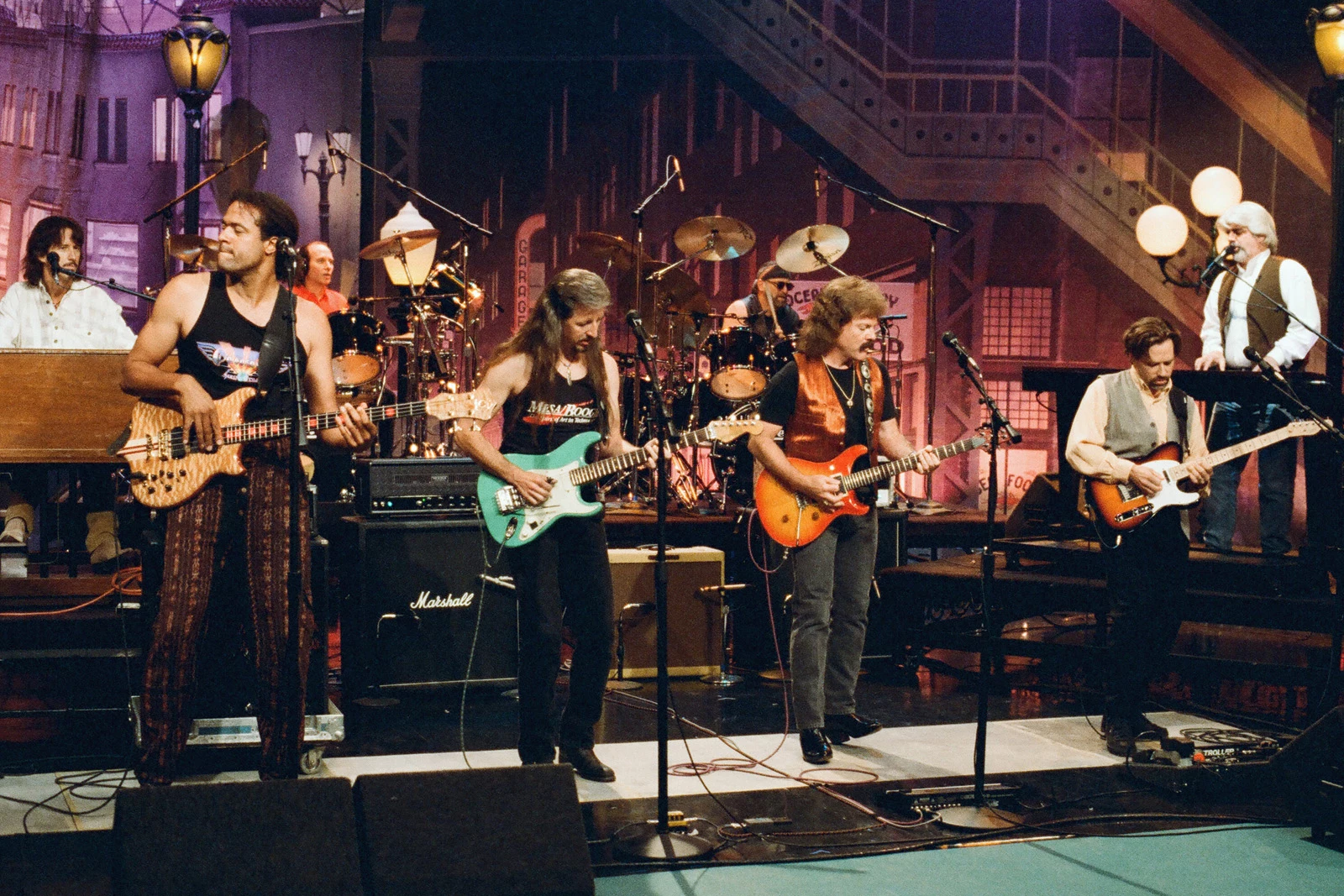
1995-96: Tom Johnston / Patrick Simmons / Michael McDonald / John McFee / Michael Hossack / Keith Knudsen / Cornelius Bumpus
McDonald returned for his first full-length tour with the Doobies since the 1982 farewell. Bumpus was also back for his last go-round. But McFee was unable to make some of the 1995 dates, and the band hired Bernie Chiaravalle, the guitarist from McDonald's solo group. Chet McCracken also came back for a spell when Knudsen had to bow out of some shows. The loss of both Porter and Weeks meant the Doobies needed a new bassist. With Cowan preferring to concentrate on his solo career, the band found a long-term touring bassist named Skylark. This lineup resulted in the 1996 live release 'Rockin’ Down the Highway: The Wildlife Concert,' a benefit for the Wildlife Conservation Society.

1996-2005: Tom Johnston / Patrick Simmons / John McFee / Michael Hossack / Keith Knudsen
Now a quintet comprised of just the guitarists and drummers, the Doobies augmented themselves in concert with Skylark, keyboardist Guy Allison and saxophonist Danny Hull, with percussionist M.B. Gordy joining the crew in 2001. Hull was replaced by Mark Russo in 1998. Allison and Russo were even brought into the studio for 2000's 'Sibling Rivalry,' the first collection of new Doobie Brothers songs since 'Brotherhood' (Cowan played bass). This configuration of the Doobies stayed intact until Knudsen's death in 2005.

2005-10: Tom Johnston / Patrick Simmons / John McFee / Michael Hossack
After Knudsen's death, the group hired Ed Toth, who'd spent the previous decade with Vertical Horizon. Health issues then forced Hossack (pictured) to leave; he died of cancer in 2012. At about the same time, Skylark suffered a stroke and left the band.

2010-19: Tom Johnston / Patrick Simmons / John McFee
Cowan returned to take over for Skylark, and the Doobies hired Tony Pia, a jazz-trained drummer who had worked with David Lee Roth, Van Morrison and the Brian Setzer Orchestra. Pia stayed through 2016, at which point the Doobie Brothers included only one drummer -- Ed Toth -- for the first time since 1971. The rhythm section was bolstered by the 2018 addition of former Allman Brothers Band percussionist Marc Quinones. Keyboardist Allison left in 2015; he was replaced by Little Feat's Bill Payne, whose association with the Doobies stretched back to 1972, when he contributed to 'Toulouse Street.' During this period, McDonald reconnected with the remaining trio to contribute vocals to 2014's 'Southbound,' which featured the group teaming up with various country acts to cover their old hits.